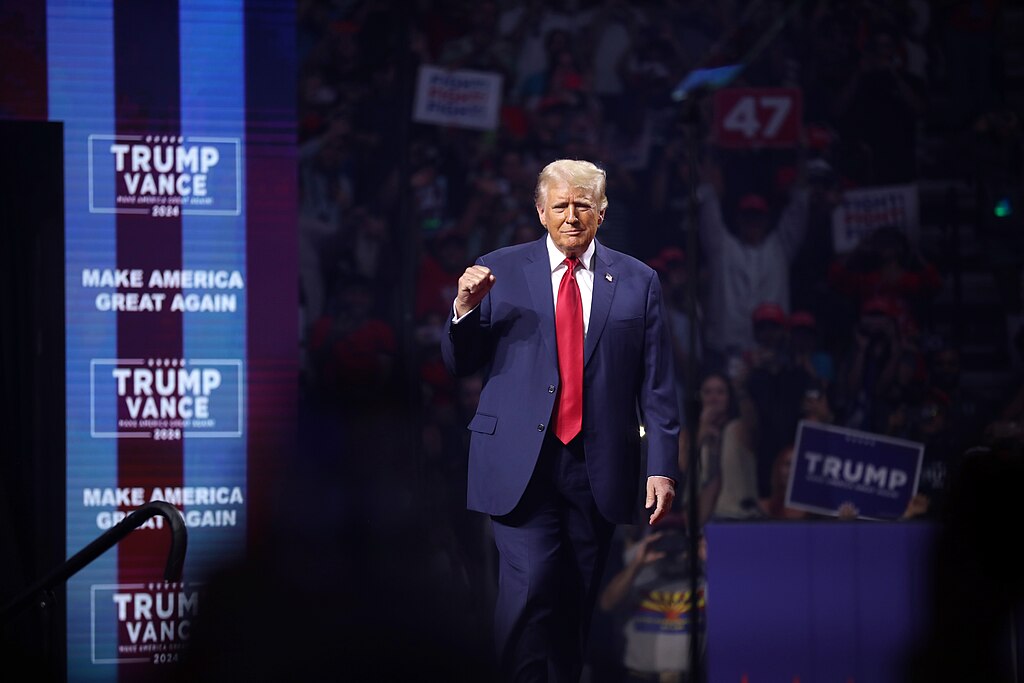In a bold new policy announcement at his Mar-a-Lago press conference today, President Donald Trump outlined a proposal to seize the assets of criminal gangs and drug cartels, directing these funds to establish a compensation fund for victims of migrant-related crime. Trump described the initiative as a critical measure to address the impact of cartel-driven crime on U.S. communities, highlighting his administration’s commitment to making what he called “America’s safety and sovereignty the utmost priority.”
The former president presented the plan as a direct countermeasure against what he described as “unchecked criminal elements” that, in his view, thrive under current immigration policies. Trump argued that the funds acquired from cartel seizures could help families and individuals who have been harmed by violent crimes tied to drug trafficking and criminal organizations. “The American people shouldn’t have to foot the bill for crimes committed by these violent cartels,” he declared. “It’s time we turn their profits into justice for our citizens.”
According to Trump, the proposed policy will target assets such as money, real estate, and luxury possessions obtained by cartels operating within or affecting the U.S. These assets, once seized, would be reallocated to support crime victims, particularly those impacted by the consequences of drug trafficking and violence at the southern border.
“We’re talking about millions, maybe billions, of dollars worth of resources that are in the hands of criminals,” Trump said. “Under this plan, we’ll take that money and use it to help the people who’ve been victimized by their actions. This isn’t about punishment alone; it’s about making a real difference for Americans who’ve suffered due to the lawlessness that’s been allowed to continue for too long.”
The plan also aims to deter criminal operations by financially undercutting cartels’ economic influence. “We’re going to take back our country’s safety and make sure criminals understand that we won’t tolerate their terrorizing of American citizens,” he added, asserting that his administration would prioritize the swift execution of these asset seizures.
Critics of the proposal have raised questions about the legal feasibility of such widespread asset confiscations and the implications of reallocating funds without court proceedings. Civil rights advocates warn that, while targeting cartel assets could reduce crime in the short term, it risks setting a precedent for asset seizures that could be misapplied or lack sufficient oversight.
Despite these concerns, Trump’s proposal has gained notable support among some conservative groups and border-state communities affected by cartel activity. Many see the fund as a restorative justice initiative that compensates those who have suffered losses due to crimes linked to drug trafficking and migrant-related violence.
In his closing remarks, Trump emphasized the plan’s immediate impact, stating, “We won’t stand by while these criminals profit off American tragedy. If elected, I’ll put this policy to work from day one, returning safety to our streets and justice to those affected.”
With the proposal sparking a strong reaction across the political spectrum, the debate surrounding Trump’s approach to criminal cartels and migrant-related crime is expected to intensify as his campaign continues. His supporters have praised the plan’s uncompromising stance, viewing it as an innovative method to address a longstanding problem.



 Trump Orders Federal Agencies to Halt Use of Anthropic AI Technology
Trump Orders Federal Agencies to Halt Use of Anthropic AI Technology  Iran Supreme Leader Ayatollah Ali Khamenei Killed in Israeli, U.S. Strikes: Reuters
Iran Supreme Leader Ayatollah Ali Khamenei Killed in Israeli, U.S. Strikes: Reuters  HHS Adds New Members to Vaccine Advisory Panel Amid Legal and Market Uncertainty
HHS Adds New Members to Vaccine Advisory Panel Amid Legal and Market Uncertainty  Middle East Conflict Escalates After Khamenei’s Death as U.S., Israel and Iran Exchange Strikes
Middle East Conflict Escalates After Khamenei’s Death as U.S., Israel and Iran Exchange Strikes  Federal Judge Blocks Virginia Social Media Age Verification Law Over First Amendment Concerns
Federal Judge Blocks Virginia Social Media Age Verification Law Over First Amendment Concerns  Macron Urges Emergency UN Security Council Meeting as US-Israel Strikes on Iran Escalate Middle East Tensions
Macron Urges Emergency UN Security Council Meeting as US-Israel Strikes on Iran Escalate Middle East Tensions  Trump to Address Nation as U.S. Launches Strikes in Iran, Axios Reports
Trump to Address Nation as U.S. Launches Strikes in Iran, Axios Reports  EU Urges Maximum Restraint in Iran Conflict Amid Fears of Regional Escalation and Oil Supply Disruption
EU Urges Maximum Restraint in Iran Conflict Amid Fears of Regional Escalation and Oil Supply Disruption  Trump Media Weighs Truth Social Spin-Off Amid $6B Fusion Energy Pivot
Trump Media Weighs Truth Social Spin-Off Amid $6B Fusion Energy Pivot  Australian PM Calls Alleged Western Australia Terror Plot “Deeply Shocking” After Arrest
Australian PM Calls Alleged Western Australia Terror Plot “Deeply Shocking” After Arrest  Trump Says U.S. Attacks on Iran Will Continue, Warns of More American Casualties
Trump Says U.S. Attacks on Iran Will Continue, Warns of More American Casualties  Argentina Senate Approves Bill to Lower Age of Criminal Responsibility to 14
Argentina Senate Approves Bill to Lower Age of Criminal Responsibility to 14  U.S.-Israel Strike on Iran Escalates Middle East Conflict, Trump Claims Khamenei Killed
U.S.-Israel Strike on Iran Escalates Middle East Conflict, Trump Claims Khamenei Killed  Zelenskiy Urges Change in Iran After U.S. and Israeli Strikes, Cites Drone Support for Russia
Zelenskiy Urges Change in Iran After U.S. and Israeli Strikes, Cites Drone Support for Russia  Trump Says U.S. Combat Operations in Iran Will Continue Until Objectives Are Met
Trump Says U.S. Combat Operations in Iran Will Continue Until Objectives Are Met  U.S. Lawmakers Question Trump’s Iran Strategy After Joint U.S.-Israeli Strikes
U.S. Lawmakers Question Trump’s Iran Strategy After Joint U.S.-Israeli Strikes  Pakistan-Afghanistan Tensions Escalate as Taliban Offer Talks After Airstrikes
Pakistan-Afghanistan Tensions Escalate as Taliban Offer Talks After Airstrikes 































